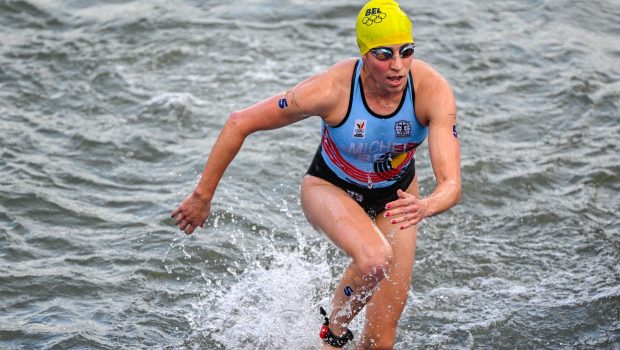Belgium Withdraws from Mixed Relay Triathlon After Athlete Falls Ill from Seine

Claire Michel was taken to a clinic in the Olympic Village after swimming in the Seine for the women’s triathlon.
Belgium’s Olympic committee (COIB) announced Sunday that their triathlon mixed relay team has withdrawn from Monday’s event after one of its athletes who swam in the Seine River last week became ill.
Claire Michel, who competed in the women’s triathlon Wednesday, finishing in 38th place, “is unfortunately ill and will have to withdraw from the competition,” the Belgian Olympic and Interfederal Committee said in a statement.
The team did not specify whether Michel was sickened by the long-polluted river with its constantly changing safe-to-swim status, which was the site of the triathlon’s 1,500-meter swim. Belgian newspaper De Standaard claimed that the 35-year-old was infected with E. coli.
Organizers had said that water quality tests done the day of the individual triathlon races showed “very good” bacteria levels. However, in the days leading up to her race, the men’s individual event was postponed and practices were canceled after water quality testing showed the Seine was unsafe for swimming.
A joint statement from World Triathlon and Paris 2024 said: “The latest test results confirm that Seine water-quality levels at the triathlon venue have improved in recent hours, with forward-looking analysis indicating that water quality will be within the levels acceptable by World Triathlon.”
La triathlète belge Claire Michel a dû être hospitalisée après son épreuve dans la seine.🫣
L’équipe belge a donc déclarer forfait pour le #triathlon de demain. Elle se trouve à l’hôpital depuis 4 jours.
L'épreuve sera-t'elle reportée de nouveau ?.🤔#OlympicGames #Olympic2024 pic.twitter.com/cKEaDUDrSO
— Geek (@geek_of_life) August 4, 2024
On Saturday, the Swiss team said that their athlete Adrien Briffod—who took part in the men’s race—had a stomach infection and would not compete in the mixed relay.
COIB added after the withdrawal that it hopes “that lessons will be learned for future triathlon competitions.”
“We are thinking of training days that can be guaranteed, competition days and formats that are clear in advance and circumstances that do not cause uncertainty among athletes, entourage, and fans.”
Daily water quality tests measure levels of fecal bacteria, including E. coli, in the Seine’s waters. Under World Triathlon’s guidelines, E. coli levels up to 1,000 colony-forming units per 100 milliliters can be considered “good” and can allow competitions to go forward.
World Triathlon’s medical committee said it considers water quality analysis, sanitary inspection, and the weather forecast when determining whether to proceed with a race. The decisions have generally been made at early morning meetings on the day of the event. However, in announcing Sunday night that the race would happen Monday, organizers said they were responding to requests from athletes to give them more time to prepare.
Bronze medalist Daniel Wiffen of Ireland, who won an earlier gold in the 800 free, said he wouldn’t train ahead of time in the Seine: “I don’t want to try to deal with any illness.”
He said he would instead train in pools around Paris, even if it means “going in blind.”